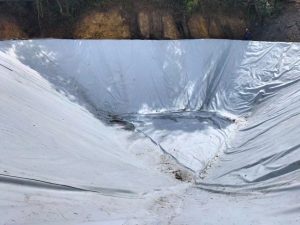
Selecting the right geomembrane for a water reservoir is crucial to ensuring its effectiveness in water conservation, durability, and protection. Different types of geomembranes offer unique advantages depending on the specific needs of the project.
Types of Geomembranes for Water Reservoirs
- High-Density Polyethylene (HDPE): HDPE geomembranes are one of the most commonly used types for water reservoirs. They offer high tensile strength, excellent chemical resistance, and durability under harsh environmental conditions. HDPE is ideal for large-scale reservoirs, where long-term performance and minimal maintenance are required.
- Low-Density Polyethylene (LDPE): LDPE geomembranes are more flexible than HDPE and offer good resistance to water and weathering. They are often used for smaller reservoirs or those with irregular shapes where flexibility in the lining is important.
- Polyvinyl Chloride (PVC): PVC geomembranes are another option for water reservoirs, particularly in areas where temperature fluctuations are a concern. They offer excellent UV resistance and can be welded into seamless sheets, minimizing the risk of leaks.
- Ethylene Propylene Diene Monomer (EPDM): EPDM geomembranes are highly resistant to temperature extremes, making them suitable for regions with wide temperature fluctuations. They are particularly useful in applications where flexibility is needed, such as in reservoirs with irregular shapes or dynamic movements.
Factors to Consider When Choosing a Geomembrane
- Water Quality: Some geomembranes may interact with the water, especially if it contains certain chemicals or salts. It’s essential to choose a geomembrane that is compatible with the specific water quality.
- Climate and Environmental Conditions: UV resistance, temperature tolerance, and resistance to chemicals are critical factors when selecting a geomembrane for a water reservoir.
- Budget: HDPE is often the most cost-effective option, but the specific needs of the reservoir might justify a higher investment in more specialized materials like EPDM or PVC.
Conclusion
Choosing the right geomembrane material is essential for maximizing the efficiency, durability, and sustainability of a water reservoir. Understanding the properties of different geomembranes and the specific requirements of the project can help ensure the best performance over the long term.






 " />
" />